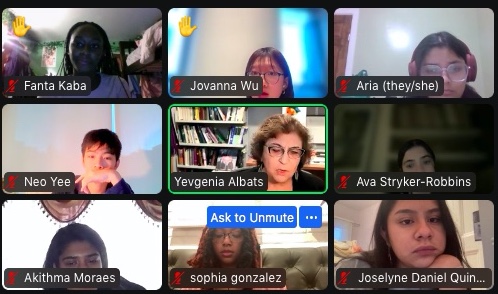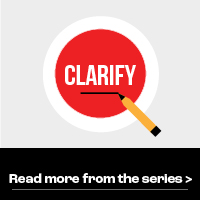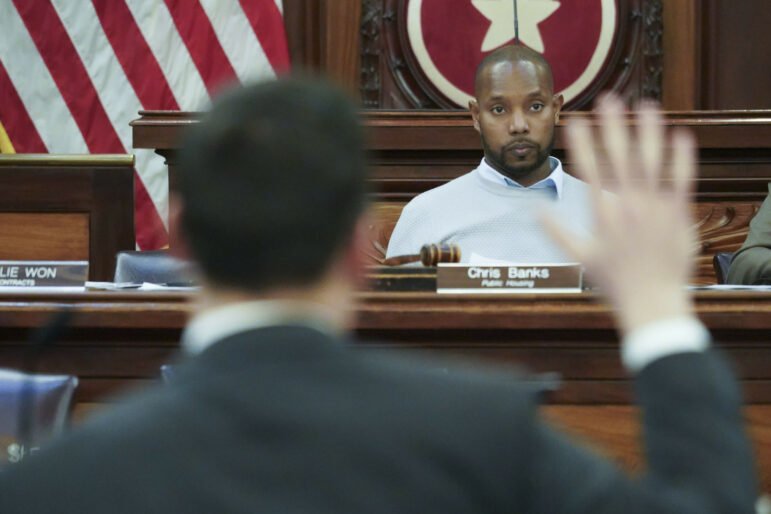Yevgenia Albats, a Russian investigative reporter who is currently the Distinguished Journalist in Residence at the NYU Jordan Center, recently spoke to City Limits’ youth reporting interns about what it’s like to be a journalist in a country that does not have a free press.

Screenshot
Dr. Yevgenia Albats, center, speaking on Zoom with student reporters enrolled in the CLARIFY program.Yevgenia Albats, a Russian investigative reporter who is currently the Distinguished Journalist in Residence at the NYU Jordan Center, recently spoke to City Limits’ youth reporting interns about what it’s like to be a journalist in a country that does not have a free press.
Albats has been an editor with Moscow-based The New Times since 2007, and continues to run the outlet despite being forced to leave Russia in August amidst ramped up media censorship, after the government pronounced her a “foreign agent” for her critical coverage of the Ukraine War. “That’s the only choice that was left—either go to jail or to leave, so I left,” Albats told CNN in October.
She recently sat down with participants in the City Limits Accountability Reporting Initiative for Youth (CLARIFY), which trains New York City high school students in public-service journalism. Here’s an overview of that conversation, which touched on the qualities of a good investigative reporter, confronting the blank page and how you can never ask too many questions.
The following conversation has been edited and condensed for clarity.
Albats [on her background]: When I started as a journalist in the Soviet Union, it was a totalitarian country, which didn’t have any freedom of speech, and no freedom of assembly. And of course, no journalism existed. It was this peculiar form of journalism when people who pretended to be journalists produced the narrative for the party in power and some others covered topics which were divorced from any politics. I covered science at the time, and then the Soviet Union fell apart in 1991, and shortly before that I joined the frontline paper of that time and started covering the Soviet Union political police, the KGB. However when I say I started covering, it wasn’t exactly right, because it was impossible to cover something that was very secretive, very closed. Basically you had to steal the information, somehow sneak in in order to write something about what was happening there. Then there was 10 years of relative freedom, and then in 2000 a KGB man became the president of Russia, and now 22 years later we have a full-fledged authoritarian regime.
CLARIFY Student Reporter: What made you want to get into investigative journalism?
Albats: Thank you for your question. I think the short answer is, curiosity. What’s lovely about our line of work is that you can be personally interested in certain subjects, curious about things and you go and you dig in. Since our job requires digging in, of course you need to know certain tools on how to do this, but still, that’s the most important thing—I’ve always been writing about stuff that I’ve been personally interested in.
CLARIFY Student Reporter: Has there ever been a moment or any point in time where you felt like you just weren’t up for investigative journalism anymore?
Albats: Oh yes, many, many times in my life. Basically, each time when I was facing the blank page and I tell myself, ‘Really, why am I doing this? Do I really want to do this? Maybe I shouldn’t do this, maybe it’s time for me to go.’
And then you make yourself write the first sentence. And then of course you delete it. And then you write the first paragraph, and of course you understand it was a total shitty paragraph. And then you write the first page and then you go, and then at some point you feel like flying, you really feel high without any drugs, you just feel high, because you realize that you’ve got the wind of the story. You know how you’re going to write this, the sections, the structure, you understand how you are going to outline your argument, how you are going to use the quotes, etc. etc., and then of course, everything’s great.
CLARIFY Student Reporter: My question is what your experience was like navigating the obstacles of being an investigative journalist in Russia. And specifically, what were your biggest challenges?
Albats: These kinds of obstacles exist in basically each and every country. Investigative journalism and political journalism is a risky business in any country, whether it’s the United States, Russia, South Africa, you name it. People who do this do it because we are in the business of telling truth to power, whether we’re talking about authorities, about rich and powerful guys, or military or dictators. So first, you have to be very much aware that what you do is really important. I believe in the common good. I believe that is something that drives us as human beings. Investigative journalism is not about money. You can become famous, but you cannot become rich.
Obstacles are everywhere, bad guys try to conceal the truth, they try to conceal information, and our job is uncovering. But it’s not enough to just uncover information, we have to prove, we have to find documentary evidence. We have to see the story from different angles, and different points of view. We can’t rely on one source because there are plenty of people around who are happy to use us to their own ends, so we have to find second sources, sometimes third sources. There will be plenty of people who try to give us wrong information, and in order to be able to define real information from fake information you have to know the subject very, very well.
You have to dig in and obtain a lot of different information, you have to read a lot, to speak to tons of people. Sometimes you use two or three sources, but you speak to 25, 30 or 40 people. But I think that any job that you try to do well is difficult to do. And of course investigative journalism, there are risks involved. I had friends in Columbia who were blown up just because they wrote investigative stories about the cartel there, and I know people in Iraq who were killed, and in Afghanistan who were killed. In my country, there were periods in the 2010s when almost each day one journalist or another in the Moscow region were beaten or killed. Because there were bad guys who didn’t want them to publish information. But that’s what we do, we overcome obstacles.
CLARIFY Student Reporter: In investigative journalism, especially in a country that suppresses freedom of speech, how did you overcome fear? Because I know it must not always have been safe to speak the truth.
Albats: That’s a good question. First of all, with experience comes protection. You know how to be careful. It takes time to develop the skills. The worst part comes when the bad guys try to go against those close to you, your kids, your relatives, your friends. The only way to deal with that is just to be very, very careful. But also it’s important not to show that you are afraid. It’s difficult not to be afraid. We’re human beings with basic human instinct—you don’t want to get beaten or to end up in a hospital. But it’s awfully important I think not to allow fear to overcome you. My answer to this is you just keep going, keep working, keep digging, keep writing.
CLARIFY Student Reporter: I’m wondering how Russia filters out the news? What is the process and is it just the government that does it, or is it also rich and powerful people? Because I’m from Hong Kong, where there is no free press anymore. So I was wondering how you deal with that?
Albats: You’re from Hong Kong so now you know the subject unfortunately. There was once a thriving press in Hong Kong and now it is very much under suppression. So you know there is censorship in Russia. The majority of publications in Russia closed since the war against Ukraine started on Feb. 24. This year the majority of all independent publications got closed, whether on paper or the web, video, or audio. When the war started, I was editing my digital only weekly and it got blocked three days into the war. I was running my radio show, “Absolute Albats,” at the then only independent broadcasting [station] left, Echo Moskvoy. The radio station was taken off the air five days into the war. Since then, I believe about 7000 internet-based news sites, organizations and other websites got closed in Russia. So basically, press and media no longer exists in the contemporary Russia. The majority of journalists left the country.
CLARIFY Student Reporter: How do you decide which topics you want to investigate?
Albats: As I said, curiosity. I’m just interested. When I started writing about the Soviet Union political police, I was interested. What did these people who interrogated and tortured my fellow Russians, what did they have in mind? Why did they do this? What kind of families did they have?
I knocked on doors and started asking questions. Curiosity is the driving tool of any journalist.
CLARIFY Student Reporter: How did you learn standard investigative journalism practices when you grew up in the Soviet Union which didn’t have a history of journalism?
Albats: That’s a good question. I think through practice, you just do it, and you ask your colleagues what they did before. Now, when there is data journalism and the internet of course it’s much easier in a way to do investigations.
Basically, our job is about asking questions. And you have to tell yourself, I cannot be shy in asking questions. And there are never enough questions that you can ask, you have to keep going and ask and ask and ask. Because it’s not just to fulfill your own curiosity—which is true, you do—but also it’s important because it provides necessary information to people, and people can make conscious choices only if they have enough information to make their choices.
CLARIFY Student Reporter: Do you plan to return to Russia?
Albats: Absolutely, I have my friends sitting in jail there, I have to get back, I have to get them out, I have to find justice for them.









